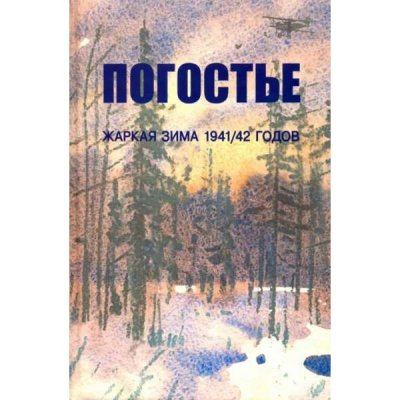Pogost'e The hot winter of 1941/42.
Pogost'e
The hot winter of 1941/42.
Collection of memoirs of veterans of the 54th army and residents of the French zone
Author: Ivanova Izolda Anatolyevna
Year of publication: 2020
Number of pages: 607
ISBN: 978-5-7325-1130-7
Format: hardcover
Book Description
This book is the final one in the series "The Fight for Leningrad", prepared by I. A. Ivanova. Prior to this, collections of memoirs of direct participants in the hostilities near Leningrad were published: “The Tragedy of Myasny Bor” (about the 2nd shock, 52nd and 59th armies of the Volkhov Front) - 4 editions, “Barrier on the Tosna River” (memoirs of veterans 55 th Army about the battles at the Ust-Tosnensky line), “Sinyavino. Autumn battles of 1941-42" about the joint actions of the Leningrad and Volkhov fronts - 2 editions. The collection "Pogostye" contains stories of veterans of the 54th Army, which drove the Germans from the city of Volkhov to the Pogostye station on the Mga-Kirishi railway. The embankment of this railway line, the participants in the bloody battles for the station and the village of Pogostye, is rightly called the “meat grinder”, which crushed 9 rifle divisions, 3 tank brigades and 2 ski battalions from December 1941 to May 1942. The troops of the 54th Army were advancing in the direction of Lyuban with the task of meeting with units of the 2nd Shock Army. In the course of intense fighting, by the spring of 1942, they were able to capture the station and the village of Pogostye, liberate a number of settlements, up to the village of Didvino, 16 km away. from Luban. But by that time, the 2nd shock was surrounded by a dense ring and could not allocate forces towards the 54th army. The Luban operation - the 3rd attempt to break the blockade of Leningrad, which lasted 6 months and swallowed up one and a half million Soviet soldiers, did not bring success, like the subsequent Sinyavin operation in September - October 1942. The troops of the Leningrad and Volkhov fronts managed to unite and break through the blockade of the great city only on January 18, 1943. Operation Iskra turned out to be successful, but stubborn battles went on throughout the 43rd year (Mginskaya, Smerdynskaya operations). The complete liberation of Leningrad land took place only in January 1944. Therefore, we annually celebrate January 27 as the day of the final liberation of Leningrad from the grip of the blockade. 2nd edition, revised.
No reviews found




































